Elder Scrolls and Fallout devs Bethesda want to release games more often, but making them last is more important
Also, Todd Howard ain't retiring anytime soon
Bethesda Games Studios are thinking about how they can release games more frequently while still ensuring that they have a healthy audience for years, the Elder Scrolls company's king wizard Todd Howard has remarked in an interview with Kinda Funny, from which Alice B has already scientifically extracted some titbits about forthcoming Starfield expansion Shattered Space.
Howard himself has been at Bethesda for 30 years, and is in his mid-50s. Asked by host Greg Miller whether he's thought about retiring, given that Bethesda's numbered titles take "forever" to develop, Howard said: no. "I don't want to ever stop. I just, you know, it's too much fun. I love the work, I love the products, if I didn't make these games I would just be playing them all the time."
He conceded, however, that "they do take a long time, and so I think one of the things that that we're focused on here is obviously making sure of the highest quality, but also you know, finding ways to increase our output, because we don't want to wait that long either, right - it's never our plan. But we want to make sure that we get it right, and so my hope is to do it kind of as long as possible. I have no plans of retiring or anything like that."
There are approximately nine years between the launch dates of Fallout 4 and Starfield. The latter saw frequent delays - as, in fairness, did many blockbuster videogames created during the pandemic lockdowns. Hence Bethesda's reputation for taking their time, but 'twas not ever thus: they released two numbered Elder Scrolls titles and Fallout 3 during the noughties, with the immortal Skyrim landing shortly after the turn of the decade. Since then, the cost and complexity of videogame blockbusters has risen dramatically, with five year development periods not uncommon, and games often landing well after their core concepts have fallen behind the trend.
That's some back-of-the-napkin commentary, anyway: as Starfield's design director Emil Pagliarulo put it on Xitter earlier this month, "development times can vary for a variety of reasons". Regarding Starfield, he added that "we spent a lot of time updating and developing tech. We also paused for a bit to assist with Fallout 76." In a subsequent tweet, Pagliarulo stressed the importance of giving teams time to cook. "We can't do everything at once. Institute scientists are hard at work on cloning initiatives!"
Bethesda Game Studios have made a bunch of other things since Fallout 4's release, of course. In the Kinda Funny interview, Howard went on to talk up resurgent MMO Fallout 76, which came out in 2018 and has been doing well in the wake of the Fallout TV show. "A lot of people dismissed it from how it launched, understandably, [but] it's kind of been sneaky popular for the last, you know, three or four years, and seeing all that attention come onto 76 now, and people coming in and saying they're really really enjoying this as a Fallout experience," he said.
Later in the interview, in a discussion of how videogame technology has changed during his tenure, Howard also underlined that Bethesda want their games to last: getting it out the door is less important than having a community that sticks around for a decade or more (the key precedent here obviously being Skyrim, which enjoys levels of perenniality only rivalled by DOOM). "I think it's a good thing, our ability to keep updating games," he said. "But that's the main pattern that you're seeing that when you make a game now, if it's a decent size it's more reasonable to say 'people will be playing this in a decade, are we set up for the future?' And that's, you know, more of what we've been doing in our development.
"That's also why you'll see us, you know, maybe make some tech decisions other people wouldn't particularly in terms of modding," Howard went on. "We want to get those tools out there and say this game is going to be extended by us and other people for a decade maybe more to come. So let's do the harder work now up front to make it extensible [rather] than just getting us to a release point."
Bethesda have five separate teams internally, according to Howard, spread across Starfield, the Fallout series, mobile projects, and (drum roll) The Elder Scrolls 6, which still doesn't have a release date, though Bethesda have recently been teasing us with talk of playing "early builds". Given how much numbered Bethesda projects tend to suck oxygen away from other developers at release, I'm happy to wait, but I would quite like to play the thing before I myself am in my 50s. If you're feeling less patient, there's always Elder Scrolls Online. Or The Axis Unseen.









